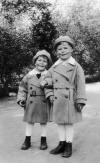|
Shmuel And Naftali (the small) Furst |
Preface by Naftali
That damned War, World War Two, ended over fifty years ago, a two generations span of time. Within that period I grew older, and I am now about sixty-five years of age.
In Israel I took active part in three more wars.
I married Ruti Heilmann. After thirteen years of marriage, we divorced.
In 1957, our daughter, Ronit, was born. She married Ehud Bibring, and thanks to her I have four grandchildren: Tom, Mika, Yoel, and Michael.
For over fifty years, my memories and emotions have been repressed deep in my soul. I told fractions of my childhood experiences on very rare occasions, and only to a handful of people.
Not once, our family discussed the importance of documenting our memories, but we never implemented the idea. Apparently, such an undertaking requires a process of evolvement and insight. In our family, that process took half a century.
It seems that as time went by, my thoughts and memories felt too crammed in my mind. They wished to break free, probably anticipating the eventuality that as I grow older, lapses in my memory may become more frequent.
Changesin the attitude of Israeli public opinion toward people like us, together with my daughter’s request and Shmuel’s consent, brought upon the decision to put in writing our family’s history.
Before telling this long and anfractuous story, I wish to touch upon several issues, which were and still are very meaningful to me.
Firstly, I would like to mention that although I am an emotional person who easily comes to tears, neither my brother and I nor our parents, ever cried during the war. Now, I can hardly comprehend that fact.
Secondly, in my testimony at “Yad Vashem” as well as in writing my recollections, I did my best to refrain from using three words: Germans, Holocaust, and Nitzolim (those who were saved) – the common Hebrew word for survivors.
Germans – I loathe the Germans of that era, particularly those who wore SS and Gestapo uniforms. Therefore, I decided to mention them only where it was absolutely necessary.
Holocaust – The use of this word in the context of day-by-day events, it lost its uniqueness, powerfulness and profoundness.
Those who were saved – I was not saved. A saved person is one who did not take part in a disastrous event, like a non-Jewish child in Monaco or Switzerland who never experienced a war.
We are survivors, cinders, who did not totally burn down in the huge flames of horror.
